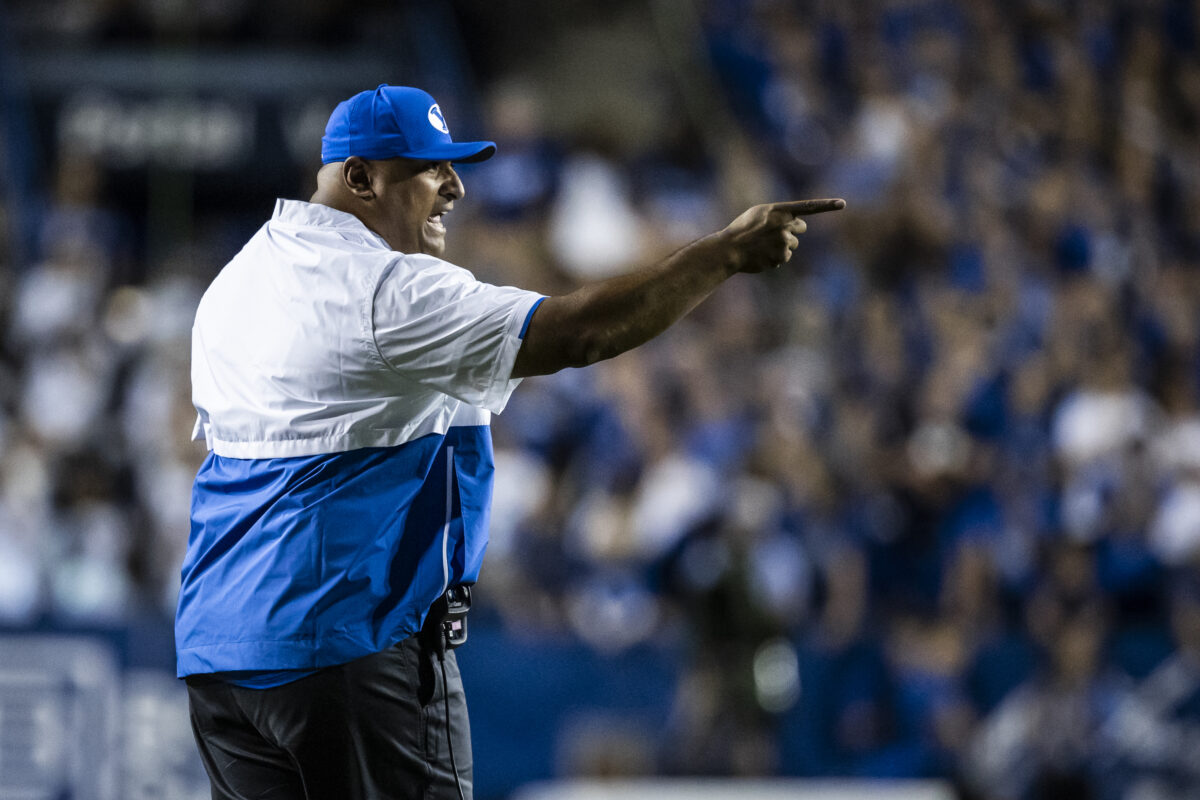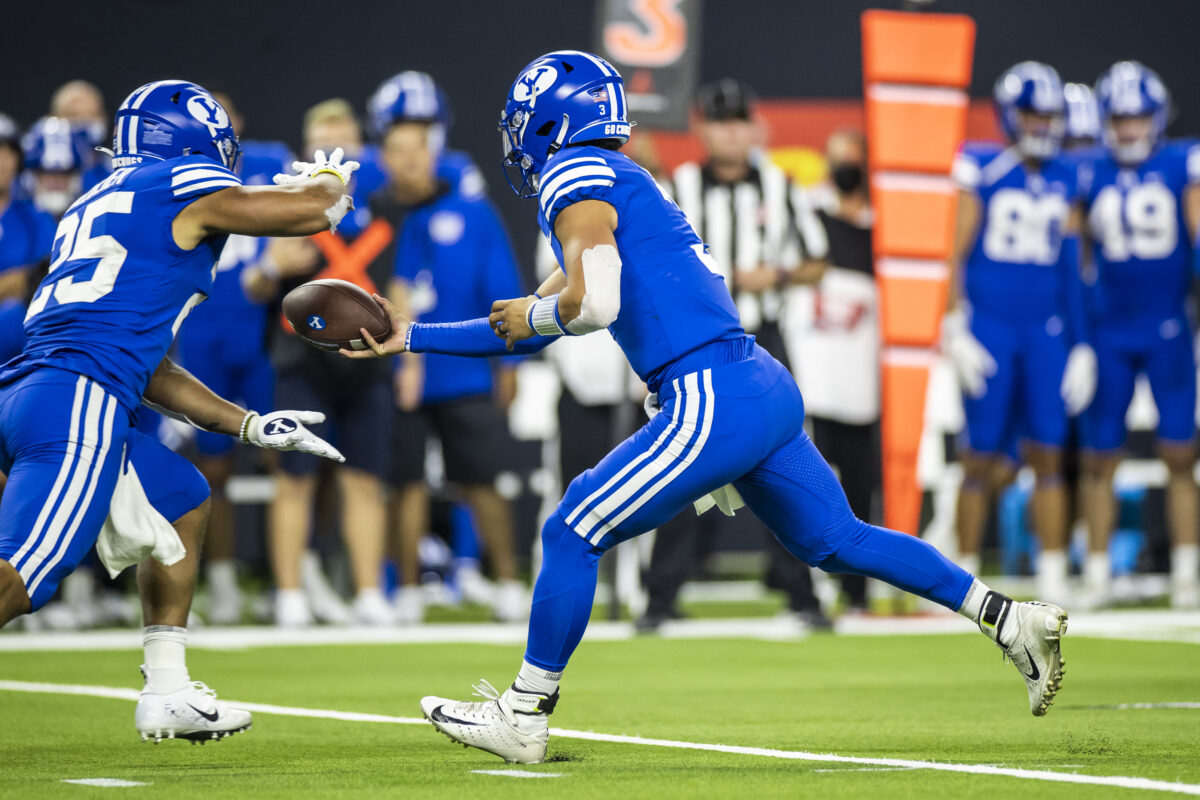To kneel or not to kneel? BYU football chooses the high road

The BYU offense lines up in "Victory" formation in a game against Georgia Southern on Saturday, Nov. 20, 2021. (BYU Courtesy Photo)
There’s a pretty obvious reason that football coaches love to see their team in “victory” formation at the end of the game.
It means you’ve won.
Everyone knows that in college football, all wins are not created equally. In reality, there’s no real way to measure just how important it is to voters or the playoff committee if a team wins by 10 or 20 or 30 points. There’s a different set of rules for non-Power 5 teams that are hard to define.
Eight times this season, BYU (9-2) has had the ball and the lead for the last possession of the game. Four times, the Cougars have run off the last five to eight minutes of a close game with the final drive. Seven times, the games have ended with a BYU quarterback taking a knee. Seven times, those drives have ended in enemy territory.
Some coaches may have been tempted to put another touchdown on the scoreboard for what many refer to as “style points.”
Not Cougar coach Kalani Sitake. In the past two seasons, he has had many opportunities to go for style points to try and impress voters and committees with a bigger margin of victory. Instead, he’s happy to take the win and move on.
Last week at Georgia Southern, BYU held a fairly comfortable 34-17 lead and took over possession of the ball on its own 30-yard line after forcing a punt. The clock showed 7:45 to play.
The Cougars ran that 7:45 off the clock with a 12-play drive that ended at the Bulldogs 6-yard line and quarterback Jaren Hall kneeling in victory formation three times.
“I love how our players embrace what we call the four-minute offense,” BYU offensive coordinator Aaron Roderick said. “In this case, it was almost an eight-minute offense. It’s almost as fun as ending the game with a touchdown. We love ending the game in victory formation. We just crushed the clock. Right after the game that’s what a lot of the players were talking about. Not the score or anything, just ‘We did it again, we ended the game in victory and taking 7:45 off the clock is really cool.'”
Sitake and Roderick aren’t the only BYU coaches to have faced this dilemma.
Lance Reynolds Sr. coached with the legendary LaVell Edwards for nearly 20 years. He’s retired now but still involved with football. He helps out his son, Lance Jr., the offensive coordinator at Orem High School and has the privilege of coaching his grandson, Lance III.
“LaVell was the class of the league and of BYU as well,” Lance Sr. said. “As an offensive staff, sometime we’d want to put the pedal down, especially late in the fourth quarter. LaVell would never let us do that. He’d tell us to stop, and if we didn’t, he’d start substituting guys. I would look out and not even recognize the guys in the game. He didn’t believe in going crazy on the score thing. Whether others believed it would help you on the national scene or not, he would not do it.”
Older BYU fans might remember that the Cougars once hung 84 points on UTEP and 70 on Utah. Reynolds pointed out that in both of those games, most of the points were scored in the first three quarters and the starters only played one possession in the second half.
In the game against UTEP in 1980, BYU scored 63 points in the first three quarters and one of the scores in the fourth was a defensive touchdown. In 1989 against Utah, future Heisman winner Ty Detmer led the Cougars on seven touchdown drives in seven possessions in the first half and one more in the third quarter before sitting out the rest of the game.
Reynolds also said he believes what comes around goes around. In 1990, BYU got hammered 65-14 in the Holiday Bowl by Texas A&M. Long-time Cougar fans are still steamed that Aggies coach R.C. Slocum ran a trick passing play while leading 44-14 in the fourth quarter. In 1994, Slocum was the defensive coordinator at Notre Dame when the Cougars went to South Bend and earned a 21-14 upset victory.
“It does come back,” Reynolds said. “It’s not the biggest reason to do it, but running up the score is just not classy and it’s not cool. You’re not proving anything. LaVell just didn’t believe in it.”
Chasing points and trying to impress voters can backfire in a big way.
The Cougars started the 2001 season 4-0 before the horrific events of 9-11 resulted in the cancellation of their game against nationally ranked Mississippi State. BYU had scheduled a bye week before the Hawaii game later in the season because of the strain of such a long road trip. School administrators decided the Mississippi State game should be rescheduled for that bye week to give the Cougars another chance to raise their national standing.
By the time the game rolled around, the Bulldogs had fallen out of the Top 20. The undefeated Cougars won on a last-second field goal but lost Doak Walker award winner Luke Staley to injury late in the game. Even though BYU was 12-0, the Bowl Championship Series committee announced the Cougars would not be considered for the national title game. The following week, BYU road tripped to Hawaii and got crushed 72-45.
“Changing that schedule and playing Mississippi State didn’t make one bit of difference,” Reynolds said. “It ended up up hurting us instead.”
Last year, BYU opted put its 9-0 record on the line at Coastal Carolina on just three days notice. Coaches and players all said after a 22-17 defeat that they had no regrets, but the loss surely cost the Cougars a better shot at a New Year’s Six bowl game.
Reynolds said he’s in total agreement with Sitake’s approach to kneeling instead of opting to try and score one more time.
“I think what Kalani does when he gets up like that, it’s a classy deal,” he said. “It’s the way it ought to be done. He puts no merit into what fans think or what national voters think. You run the two-minute offense because you’re trying to score. You run the four-minute offense because you’re trying to slow things down. You’re burning the clock so the other team can’t get the ball. The idea is to win the football game.”
Reynolds said if players had questions about kneeling instead of scoring, he would tell them this: “You explain that you want to be a first-class program. When you run up the score it reflects badly on me and the staff and our guys. When it’s all done, who is BYU? What kind of program are we?”
Cougar wide receiver Gunner Romney said the offense always wants to get into the end zone but the only thing that matters to him is winning.
“The goal as an offense is to score every time we get the ball, but the goal as a team is to win the game,” he said. “So if we’re up on the scoreboard I’m happy with the win because at the end of the day the reason that we want to score points on offense is to win the game. There’s no other way I’d rather end the game than in victory formation.”
As for style points, Romney said the Cougars don’t concern themselves with that.
“We don’t talk about what could have been. We just look to the next game and think about if we take care of this game, it’s all that matters.”

BYU coach Kalani Sitake gives instructions to his players during a game against the University of Utah at LaVell Edwards Stadium on Saturday, Sept. 11, 2021. (BYU Courtesy Photo)

BYU quarterback Jaren Hall hands the ball off to running back Tyler Allgeier in a game against Arizona at Allegiant Stadium on Saturday, Sept. 4, 2021. (BYU Courtesy Photo)



